Olena Zajčenko strávila první tři měsíce svého uprchlického života v Praze, kde hrála v uprchlickém divadle ve hře Trezor o prvních dnech invaze na Ukrajinu. Hru napsali ukrajinští uprchličtí básníci a byla strhující. To znamená, že začátek představení ohlašovala siréna leteckého poplachu, byla vytvořena atmosféra protiatomového krytu a většina herců předstírala, že jsou obyčejní diváci. Ti se do děje zapojovali v průběhu hry. Sama autorka hrála matku padlého ukrajinského vojáka.
Těsně před premiérou organizátoři herce zklamali: nevytiskli plakát. Olena ho tedy hodinu před premiérou nakreslila černým fixem. Originál zůstal v archivu pražské galerie 3 Břehy. Ale výtvarnice se nemohla zastavit. Fixami, tuší a linery vytrvale malovala sérii Bombové kryty. A na papír vylévala to, co se odmítalo stát slovy o této invazi.
Olena Zaichenko spent the first three months of her refugee life in Prague, performing in a refugee theater in the play “The Vault” about the first days of the invasion of Ukraine. The play was written by Ukrainian refugee poets and was immersive. That is, the beginning of the play was announced by an air raid siren, the atmosphere of a bomb shelter was recreated, and most of the actors pretended to be ordinary spectators. But they joined the action as the play progressed. The artist herself played the mother of a fallen Ukrainian soldier.
Just before the premiere, the organizers let the actors down: they didn’t print the poster. So Olena drew it with a black marker an hour before the premiere. The original remained in the archive of the Prague art gallery 3 Břeh. But the artist could not stop. With markers, ink, and liners, she persistently painted the Bomb Shelters series. And she poured out on paper what refused to become words about this invasion.
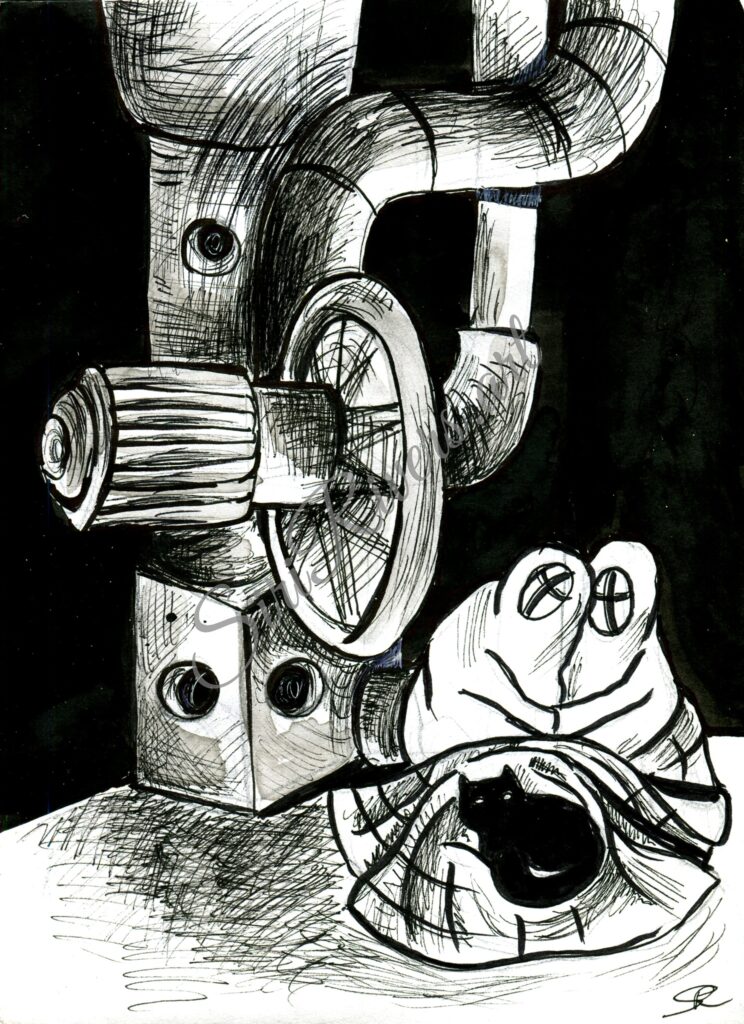
Častěji než v úkrytech (možná ani žádné nebyly) nebo v metru (zkuste utéct) se lidé schovávali ve sklepích.
Ze stropu visela zaprášená holá lampa. Svítí jako světluška s anémií. Vrhá spíš znepokojivé stíny než světlo. Picasso a Vag Gogh kdysi takové „lampové oči“ malovali jako něco bolestného, znepokojivého, děsivého. Připadáme si, jako bychom se ocitli uvnitř opuštěné průmyslové zóny.
More often than in valuts (there might not have been any) or in the subway (try running), people hid in basements.
A dusty, bare lamp hangs from the ceiling. It shines like a firefly with anemia. It casts more disturbing shadows than light. Picasso and Vag Gogh once painted such “lamp-eyes” as something painful, disturbing, scary. We feel as if we are inside an abandoned industrial zone.
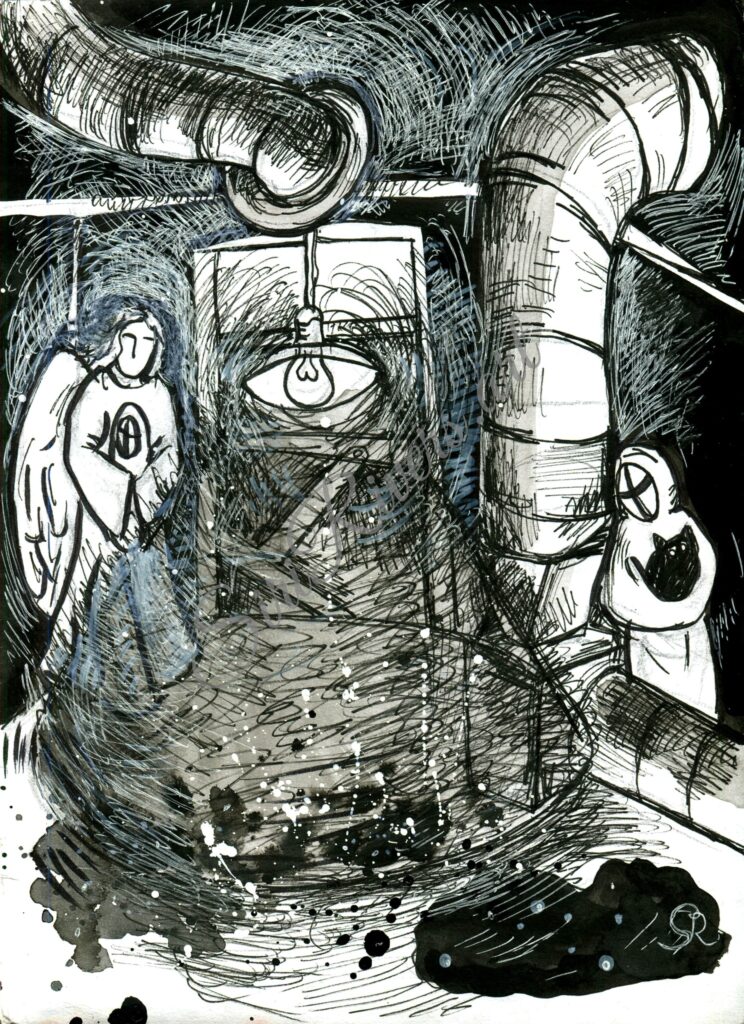
Některé staré trubky se kroutí. Kape z nich. Skvrny a stíny na zdi jsou jako nezvaný Roscharchův test.
Some old pipes are wriggling. They are dripping. The stains and shadows on the wall are like an uninvited Roscharch test.
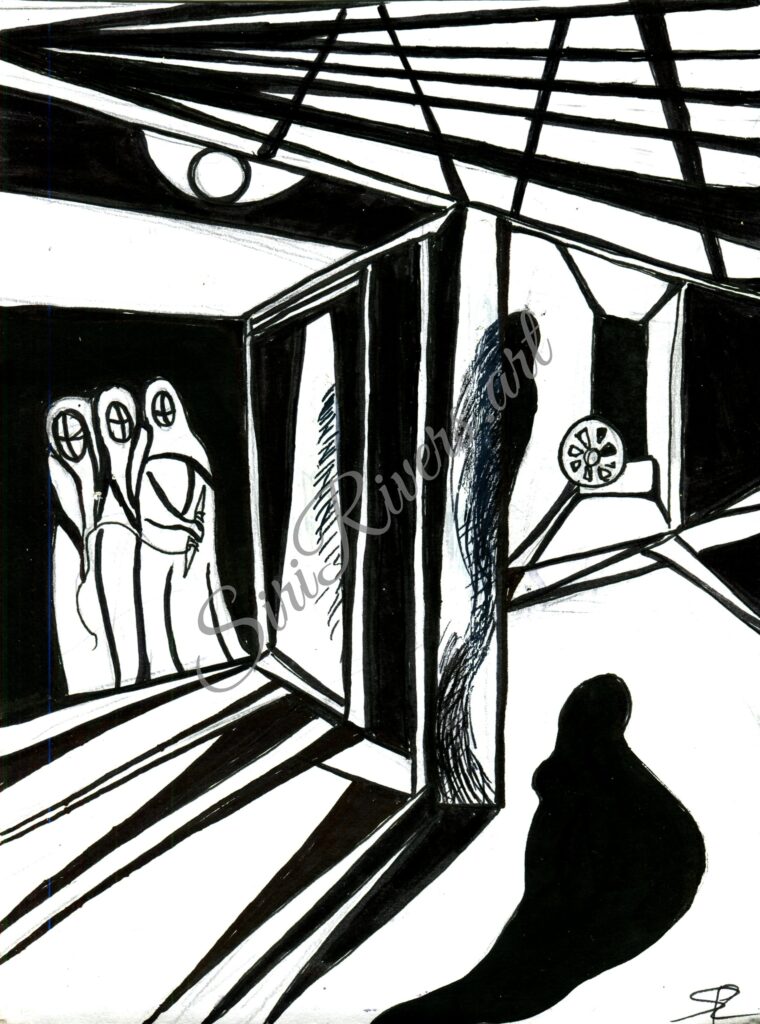
It stinks of dampness and mold. Panic spreads through my soul like stains on dark clothes.
Páchne to tu vlhkostí a plísní. Duší se šíří panika jako skvrny na tmavém oblečení.
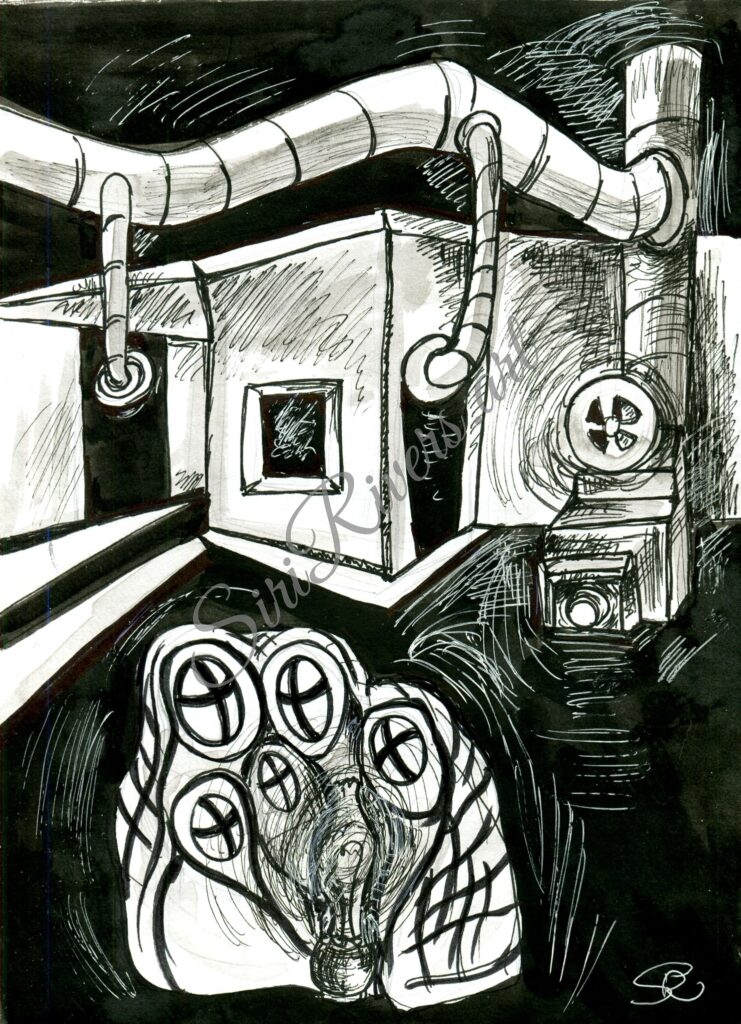
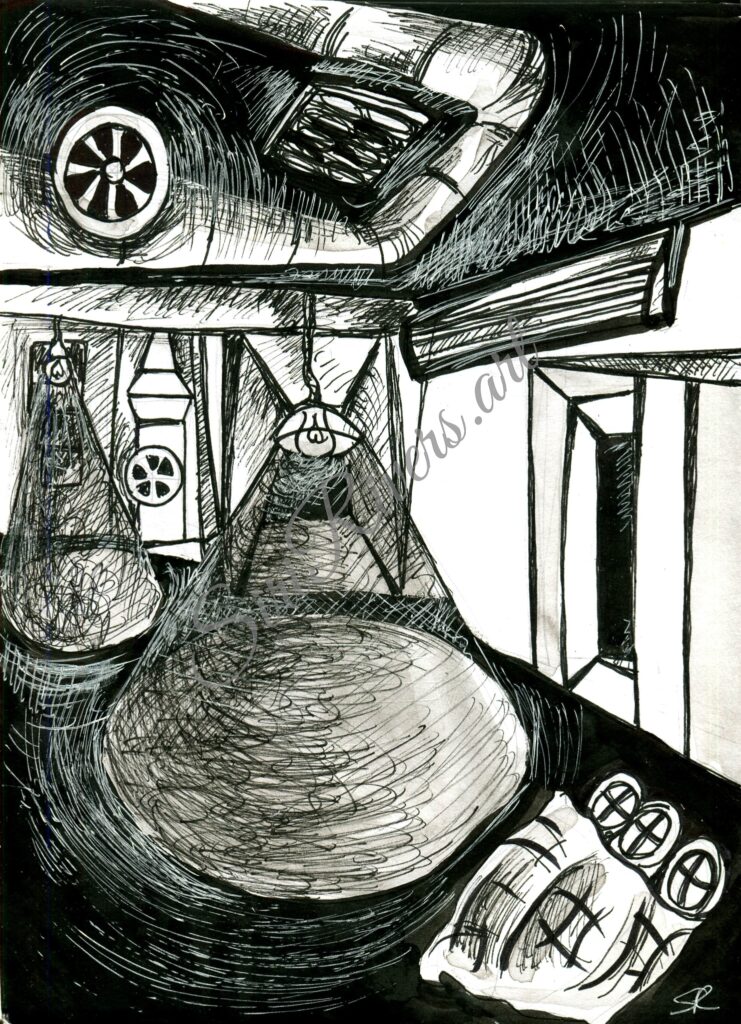
Someone’s Shadows remain in their last refuges. In basements.
Něčí Stíny zůstávají ve svých posledních krytech. Ve sklepích.
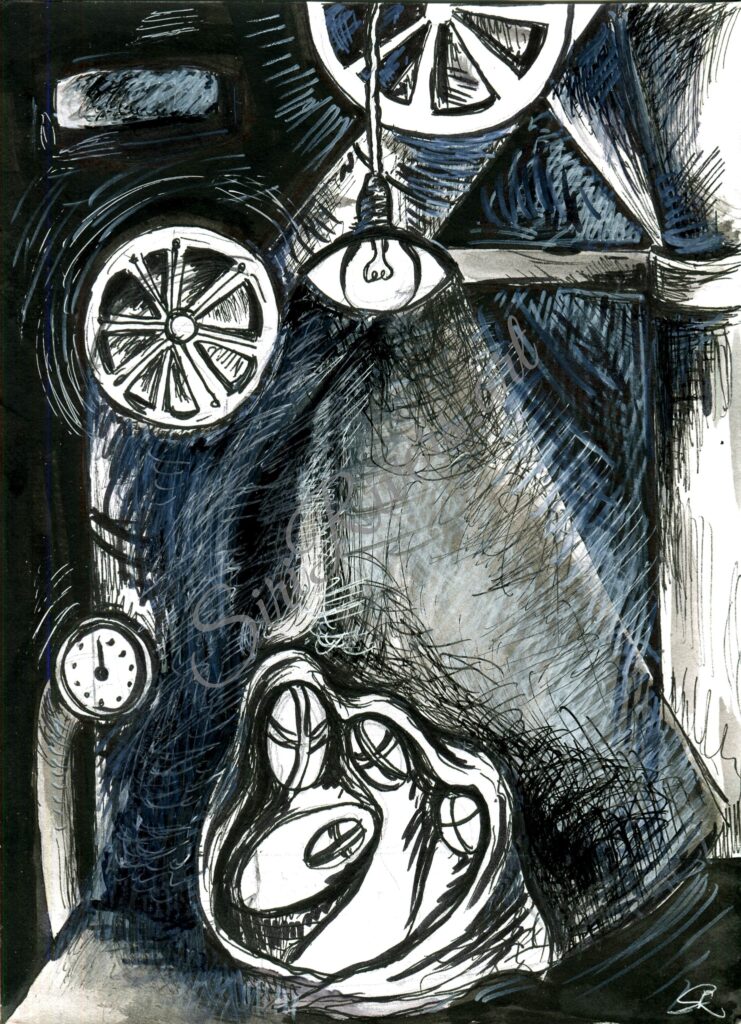
The ground is moving dullly. It’s air defense, baby, don’t cry.
People cling to each other, huddle under blankets. A candle saves not so much with its light as with the feeling of warmth. The flame is alive.
Země se ohlušujícím způsobem hýbe. Je to protivzdušná obrana, zlato, neplač.
Lidé se drží jeden druhého, choulí se pod dekami. Svíčka nezachraňuje ani tak svým světlem, jako spíš pocitem tepla. Plamen je živý.
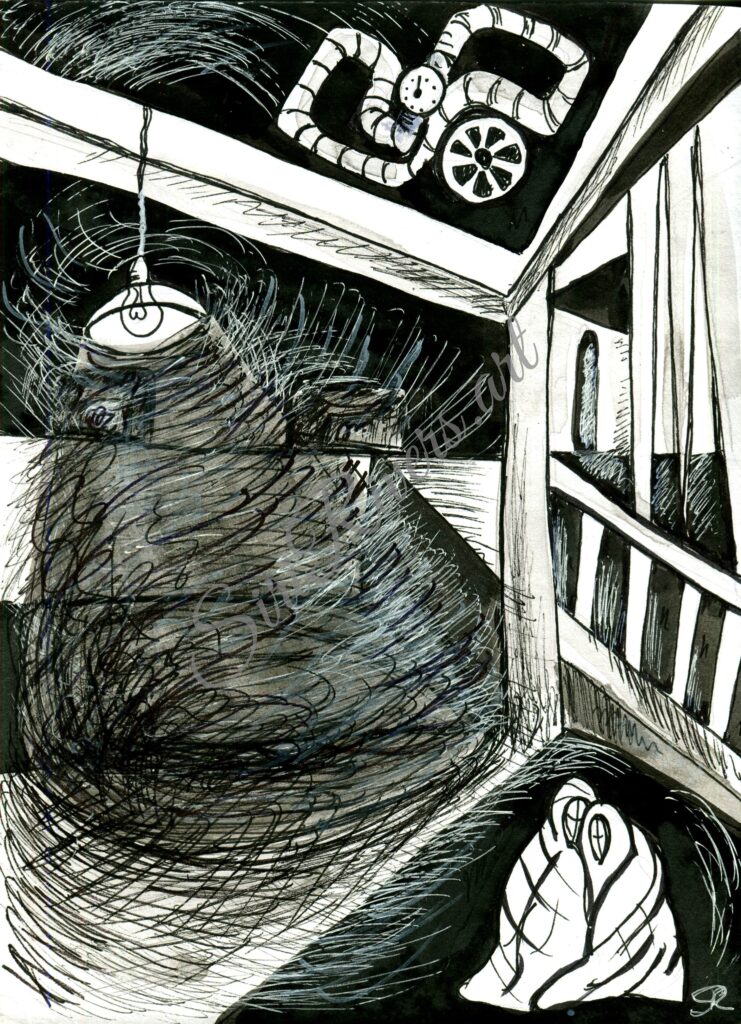
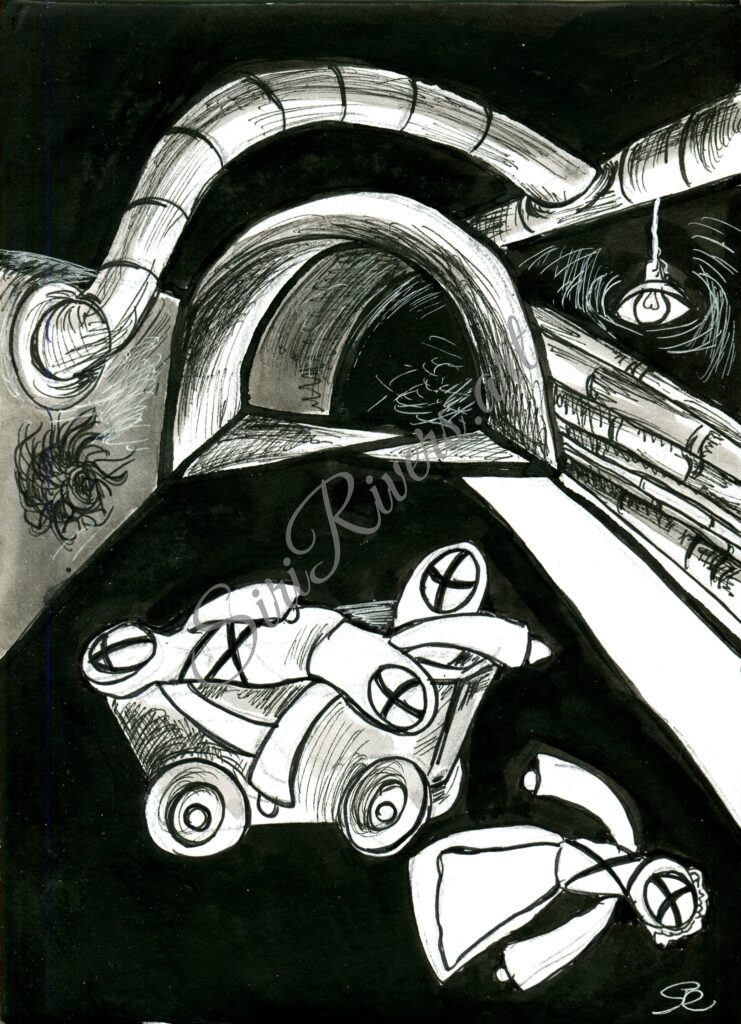
Dead people are like rag dolls in a cart.
Dead people are like rag dolls in a cart.
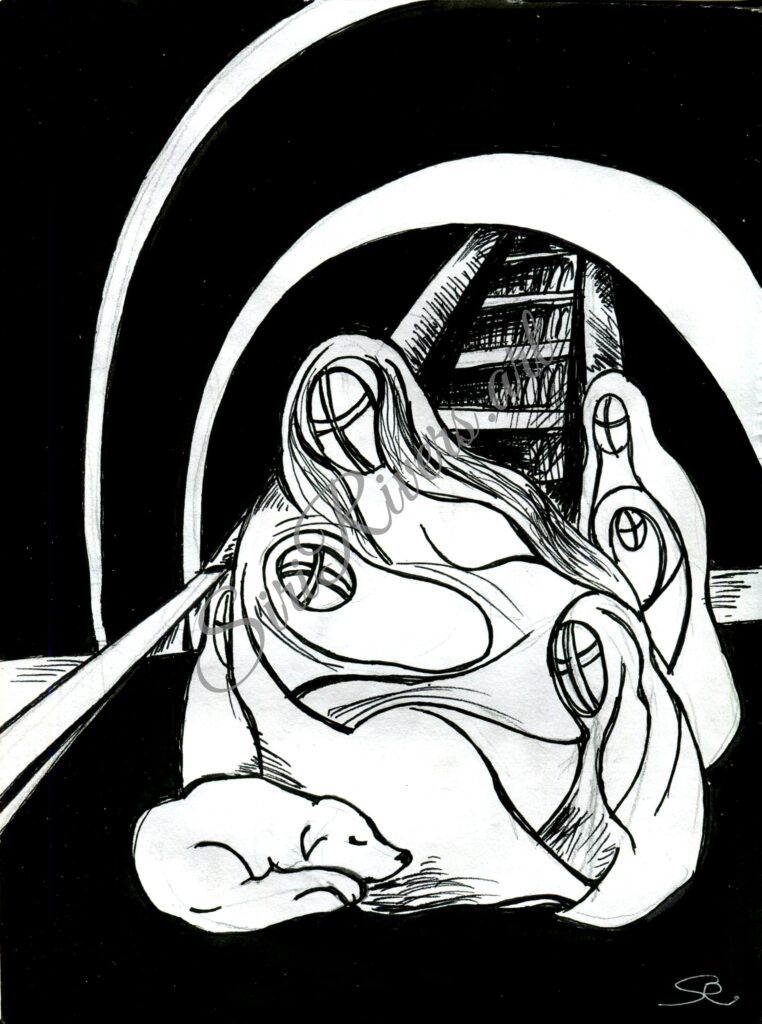
The Madonna of the Metro (the Ukrainian woman in the famous photo feeding the baby in the shelter) is surrounded by children. A dog sleeps peacefully next to her.
Our Lady herself has been fled. Jesus Christ himself knows what it is like to be the son of refugees.
Madona z Metro (Ukrajinka ze slavné fotografie, jak krmí dítě v krytu) je obklopena dětmi. Vedle ní klidně spí pes.
Sama Panna Maria byla uprchlíсi. Sám Ježíš Kristus ví, jaké to je být synem uprchlíků.
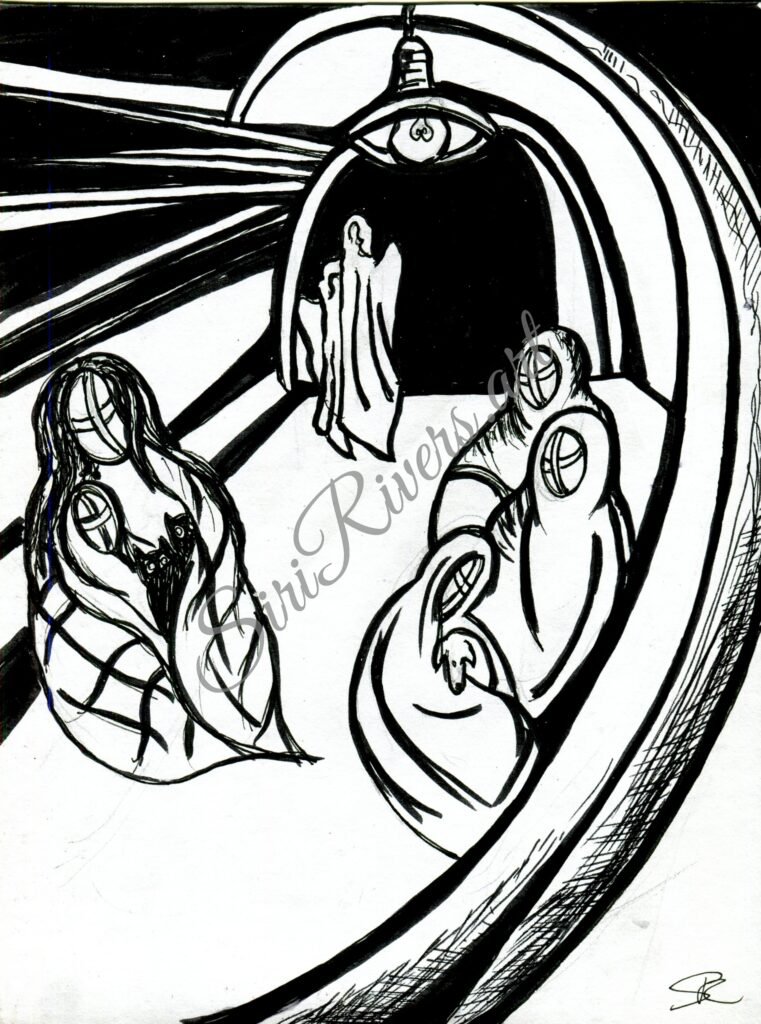
Each of us cherishes hope. Cultivate the best in yourself. Help your neighbor. Does not allow himself to be shattered in hell.
Each of us harbors hope. He cultivates the best in himself. He helps his fellow man. He doesn’t let himself be shattered in a rolling hell.
Angels come down to our hiding places. And they can pretend to be people. When they receive permission from God to perform a miracle. To save the life of a person, an animal or just someone’s Immortal Soul from despair. Or they bring souls of newborns to mothers.
Or they come down to Earth to find God. After all, Jesus is now in the trenches. Only the Father and the Holy Spirit know where the Son is.
V kryty k nám sestupují andělé. Mohou se vydávat za lidi. Když dostanou od Boha svolení udělat zázrak. Aby zachránili život člověka, zvířete nebo jen něčí Nesmrtelnou Duši před zoufalstvím. Nebo přinášejí duše novorozenců matkám.
Nebo přicházejí na Zemi, aby našli Boha. Koneckonců Ježíš je nyní v zákopech. Jen Otec a Duch Svatý vědí, kde je Syn.
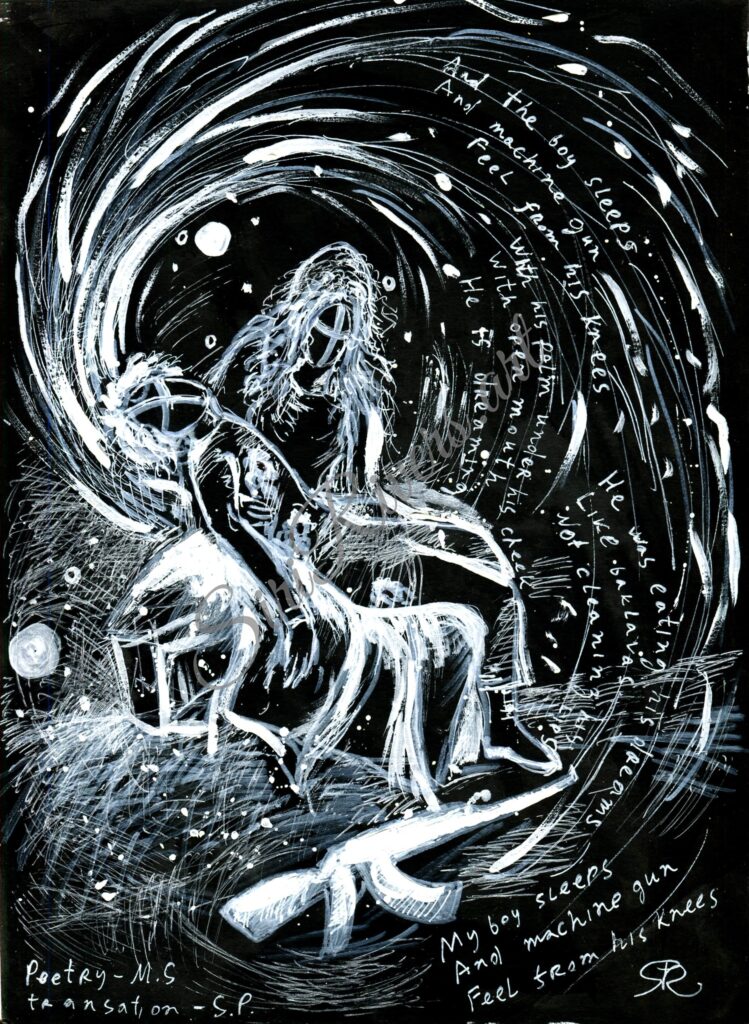
Matka oplakává svého mrtvého syna. Pokud si myslíte, že vypadá jako Madona z Oplakávání, nemýlíte se.
Tato pohlednice je monologem Matky ze hry Úkryt (scéna Obráncovy smrti).
A mother is mourning her dead son. If you think that she looks like the Madonna from the Lamentation scene, you are right.
This postcard is a monologue by the Mother from the play The Shelter (the scene of the death of the Protector).
And the boy sleehs
And the machine gun
Fell from his knees
With his palm under his cheek
With an open mouth
He is dreaming
He was eating his dreams
Like baklavas
Not cleaning his lips
My boy is sleeps
And the machine gun Feel from his knees
(Co. Magrit Aleksandrsson, trad. Sajar Jorhensson)
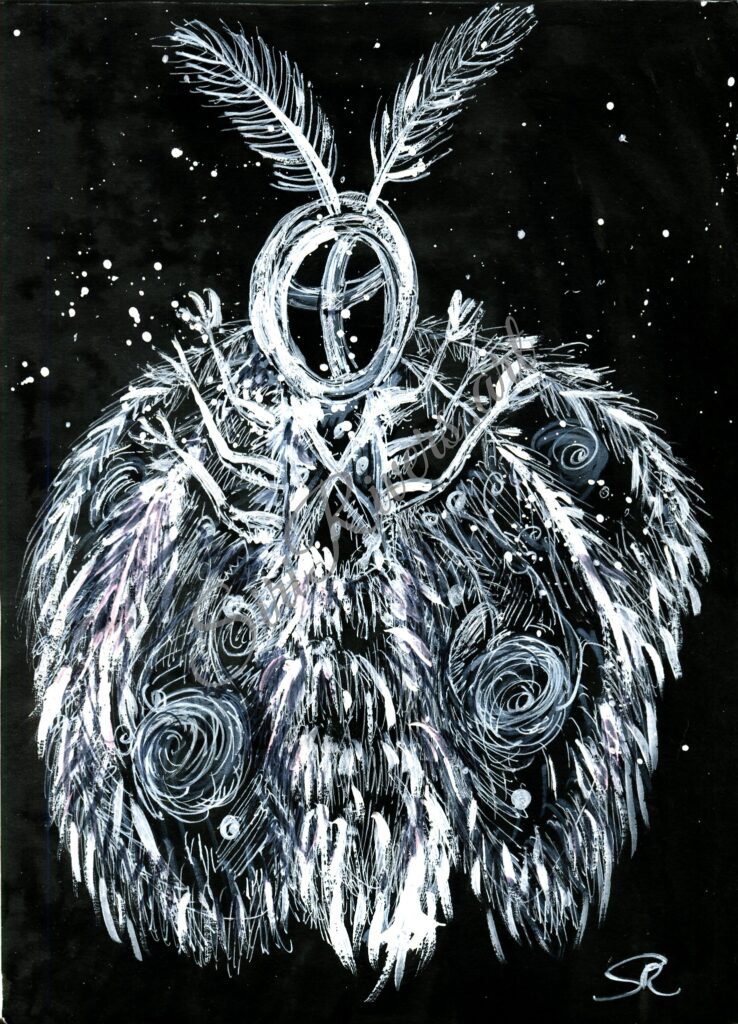
Věděli jste, že chlupatá noční můra je starobylým symbolem duše zemřelého? Babičky na vesnicích jí dokonce říkají Dušička. To je moje noční můra. Lechtá mě to zevnitř. A já se dusím slzami. A dusí mě panika. A nemůžu dýchat kvůli úzkosti.
Did you know that the hairy night moth is an ancient symbol of the soul of the deceased? Old women in the villages even call it Dushka. This is my nightmare. It tickles me from the inside. And I choke on my tears. And I am choked with panic. And I can’t breathe because of anxiety.
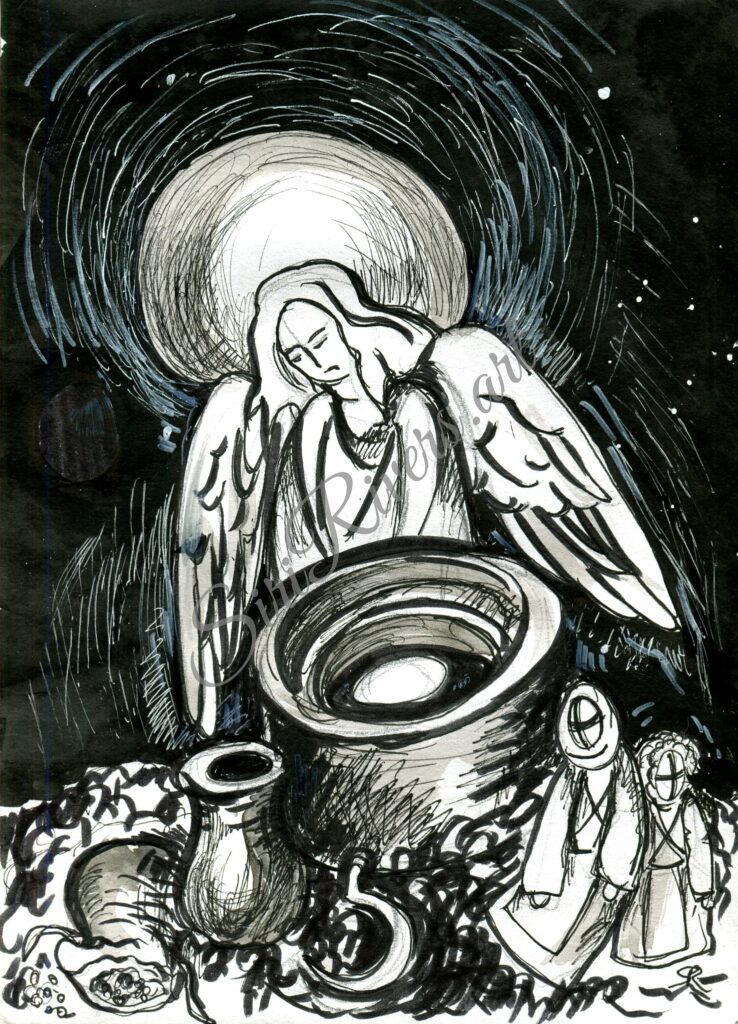
An angel looks into the Well of Destiny
Anděl se dívá do Studny osudu
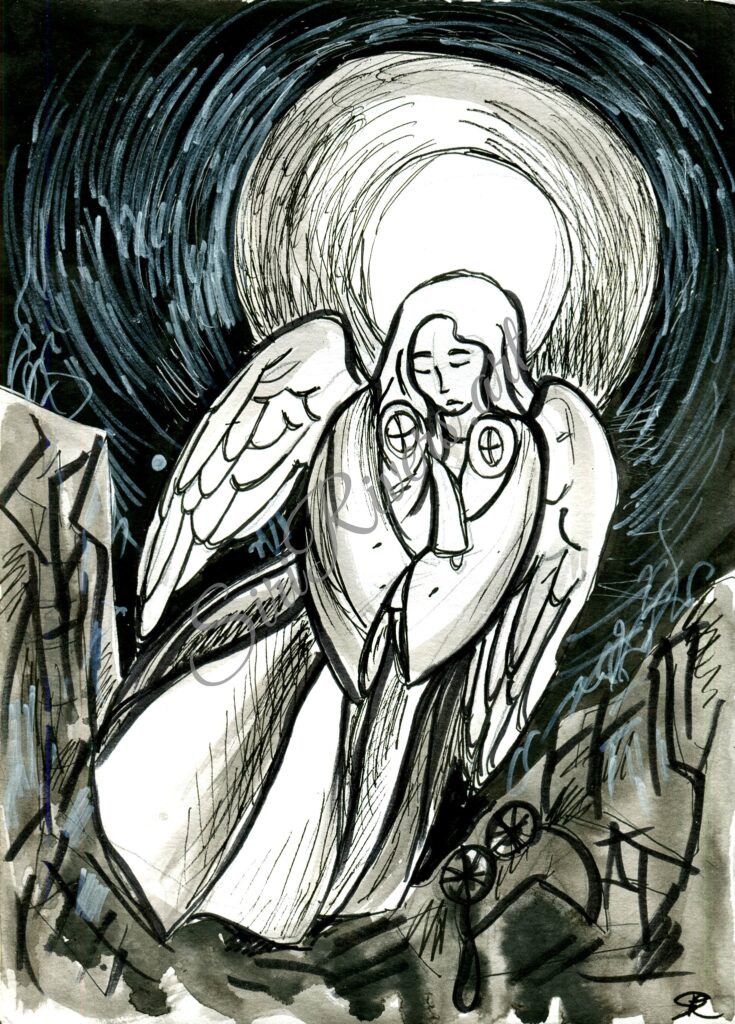
The angel looks toward the Well of Destiny. At his feet are three Judge dolls. God and the Angels are above them and above the people.
Anděl pohlédne ke Studni Osudu. U jeho nohou leží tři panenky Soudičky. Bůh a andělé jsou nad nimi a nad lidmi.

The three Judges look down from heaven to Earth into the Well of Destiny. And they see in its water a torn maiden’s wreath, a bride’s wreath, lying near the Well. Because Heaven itself is crying for the girls who were killed, tortured, and maimed by the occupiers. Who will never wear their bridal wreath again. And will not give birth to children.
Tři Soudičky se dívají z Nebe na Zem do Studny Osudu. A v její vodě spatří tuto hroznou valku. Vedle Studny leži roztržený dívčí věnec, nevěstin věnec. Protože samotné Nebe pláče pro dívky, které okupanti zabili, mučili a zmrzačili. Které už nebudou nosit svůj svatební věneček. A neporodí děti.
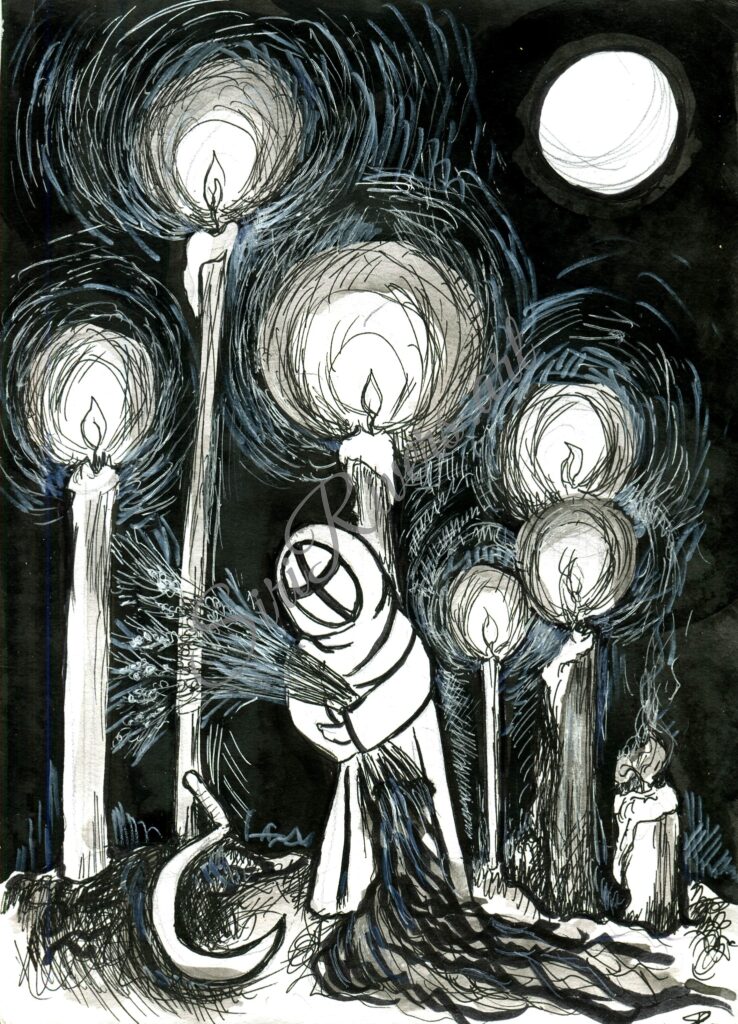
The Judenitsy will gather the ears of human lives under the flickering of the Candles of Remembrance. For the human soul has to taste its Bread of Life before a new birth. And for the righteous, heroes and innocents, it will be sweet. And for murderers, modern executioners and traitors, the Bread will be bitter like wormwood. And their new life will be bitter. It depends on the human choice how many sweet or bitter grains there will be in the Bread of Life.
Soudičky budou sbírat klasy lidských životů pod mihotáním Vzpomínkovych Svíček. Lidská duše totiž musí před novým zrozením ochutnat svůj Chléb Života. A pro spravedlivé, hrdinové a nevinné to bude sladké. Ale pro vrahy, novodobé katy a zrádce bude Chléb hořký jako pelyněk. A jejich nový život bude hořký. Počet sladkých či hořkých zrnek v Chlebu Života a závisí na rozhodnutí lidí.
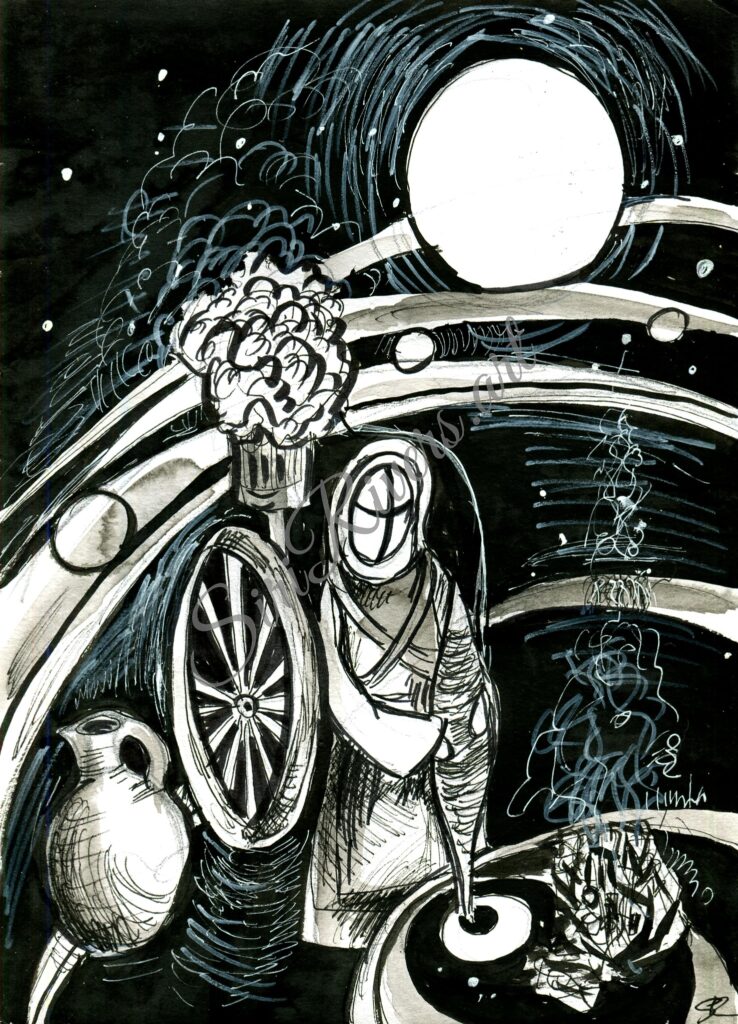
Can Moira cry? Can the Judges do anything about it?
They will not stop spinning the Threads of Destiny. They will continue to water the Tree of Life. Because people have to be born. And the world has to live.
Můžou Moiry plakat? Mohou Soudičci něco udělat?
Nepřestanou spřádat Životní Nitě. Budou dál zalévat Životní Strom. Protože lidé se musí narodit. A svět musí žít.
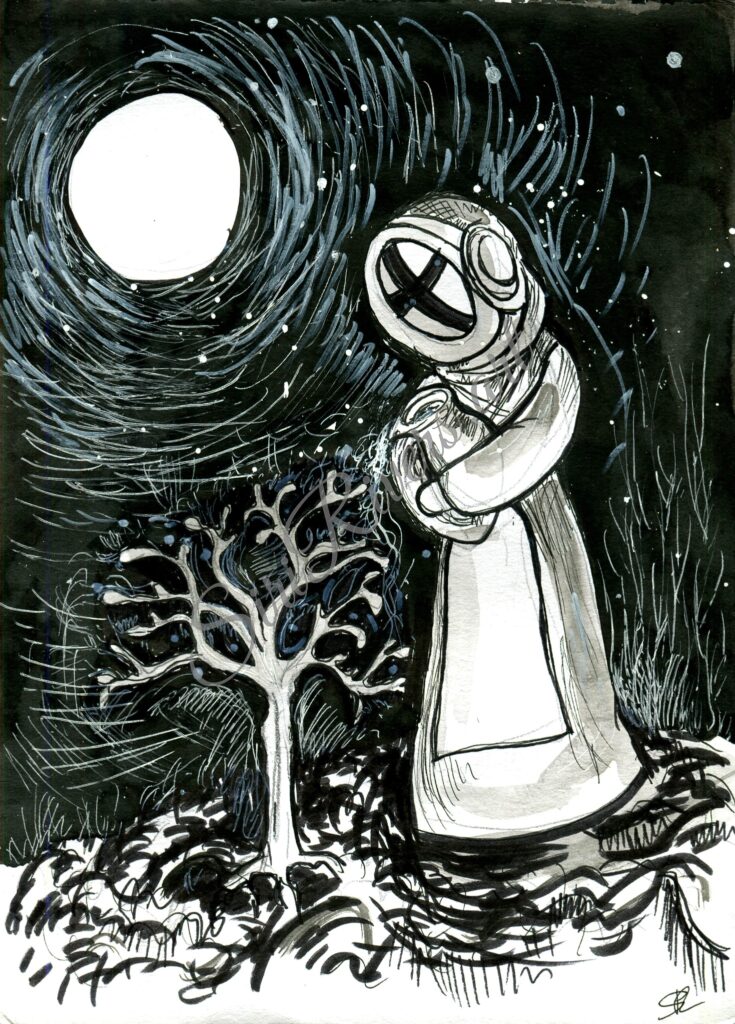
People will be born again and again. The virgin will become the Mother. And the Mother will become an Old Woman. And then she will be reborn again. The wheel of the Heavenly Spinning Wheel is turning. Sparks fly from it and become stars.
Lidé se budou rodit znovu a znovu. Panna se stane Matkou. A Matka se stane Stařenkou. A pak se znovu narodí. Kolo Nebeského Kolovrátku se otáčí. Létají z něj jiskry a stávají se z nich hvězdy.
